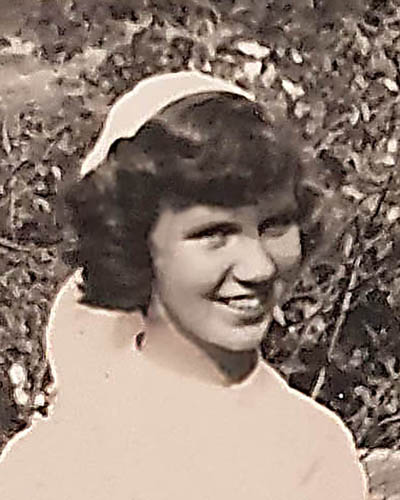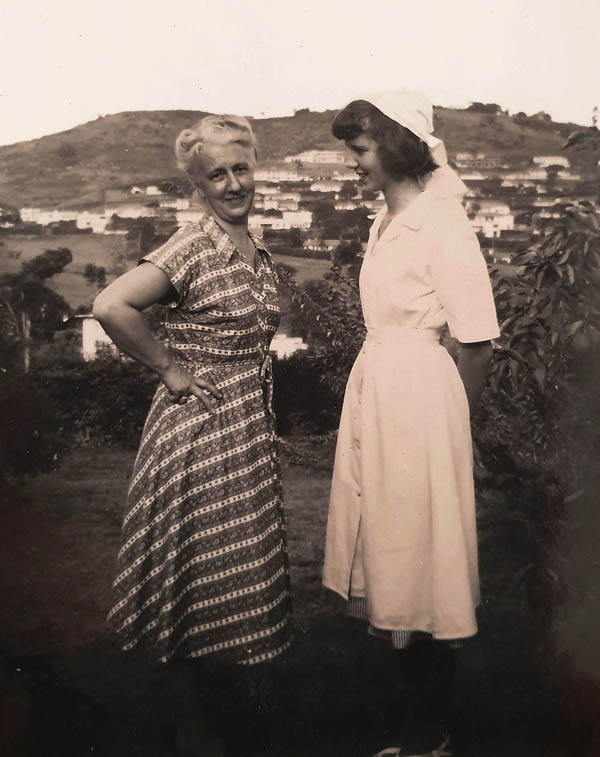and an event triggers a night of emotions.
|
Soon after my sister Willy’s funeral, a family friend who lives in the Netherlands happened to visit my cousin Jan Moeselaar, and was shown an old photo album in which Jan had put together some photos from his days in Africa.
Jan (a contemporary of Willy’s and very elderly by now) had lived for a while in East Africa when he took a job there working for the same company that my Dad used to work for. At that time he was still a young bachelor, and he hung out a lot with us in Kampala – and took the photos, which are now saved in this album. It was these photos that caught the eye of the family friend (Peter Diebels) who realized that they would be of great interest to me. Peter kindly offered to make digital copies of the photos in the album and send them to me. Within the collection of pictures he sent me, I spotted a couple of pictures of Willy showing off her new uniform, which was associated with a significant life transition for her – just before she “left home” and flew the nest to start her own life as an independent adult. These pictures reminded me of an event involving Willy around that time which caused both my Mother and Father to become completely unglued and beside themselves with fear and anger. It upset them so much that the event was never discussed again in the family, and these photos (a reminder of that event) were I think banished from view as too painful a reminder – but somehow Jan Moeselaar had a copy of those pictures which have now surfaced many years later. I had a vague recollection that these photos existed – but they were never retained in any family album as far as I know, and I think the ones that Jan Moeselaar had in his album are possibly the only copies that were not destroyed as a painful reminder of the event that so upset my parents. Here’s the story… Will had completed her secondary schooling at the Loreto Convent in Msongari, a few miles outside Nairobi and about 400 miles from our home in Kampala, Uganda. When you attend boarding school like this – where you are “at school” the whole day every day, it results generally in you taking you final exams at an earlier age than is usually the case. More hours per day and more days are spent in class with the result that the standard education curriculum is completed in a relatively shorter time and the pupil becomes a “school leaver” at a younger age than might be the norm elsewhere.
You should realize that even rudimentary (let alone trained) medical care was scarce in that environment – simply because the proportion of educated people within the overall population was so low. By “educated” – I mean people who could read and write, had learned the rudiments of sanitation and understood the existence of invisible things like parasites, bacteria, and viruses. People who understood that some diseases were infectious (and not inflicted by a witch-doctor’s curse or the revenge of a wounded animal) while others were just something that had malfunctioned in the body without necessarily any provocation from an infectious agent.
And Willy was in her element – being useful and providing some basic medical help to the clamoring masses. Then one evening it happened. My parents were away for the evening, attending some kind of function, while Willy and I were at home – just passing the time either reading a book or listening to the radio. And then a motor-cycle came down the driveway, ridden by an African. He came to the door and excitedly asked for “Memsahib kidogo daktari” (The young lady doctor). He explained that he came from a slum area just outside the town of Kamapala called Wandegeya. And there his pregnant wife was in labor and having difficulties and would most surely die if a “Daktari mzungu ” (White doctor) did not come to her aid immediately. Willy of course knew next-to-nothing about midwifery. She had witnessed and helped in handful of births – but that was about it. And the idea! … To have a young white teenage girl accompany an unknown African on the back of his motor-bike to go into the slums of Kampala somewhere in the middle of the night – absolutely unthinkable. Except to Willy. I was 5 years her junior, maybe 12 or 13 years old, and to me she was a relatively sophisticated “grown up” woman. So I was in no position to forbid her to go. And my parents wouldn’t be back for hours And so it happened – Willy donned her uniform and disappeared into the night - hitching a ride to some unknown destination in the seedier area of Kampala, on the back of a motor-cycle, driven by some completely unknown African… And completely unqualified or prepared to deal with anything that might involve more than a basic knowledge of First Aid. And then around 10 p.m. my parents returned home. “Where was Willy?” they asked.
In quick succession there followed shock, fear, anger, tears, more fear, frustration, more fear, more anger and tears…. Midnight came and went. My Dad called the Commissioner of Police – the most senior policeman in all the land. He was as helpful as could be – but nobody could offer even the slightest clue as to who, what, or where… to even start to look. 2 a.m. and then 4 a.m. came and went, and then dawn. And still no Will. And then around 8 o’clock, as the sun was actually warming the land, she came walking down the driveway, red-eyed, exhausted, and grinning broadly – to be welcomed by a storm of recrimination and shouting and tears and hugs and anger and jubilation and relief – and more anger. I can still remember her words after the reception committee calmed down. “I think I saved the little blighter, and the Mother is doing fine. Now I need to dump my clothes in the wash and climb into a bath with some Dettol – I’m covered in blood and shit.”This episode remains vivid in my memory because I had never before (or since) seen my parents so emotionally overwrought . Later we learned that indeed Mother and child were doing well. On arrival at the scene and examining the patient, Will had immediately written a note describing the situation and sent it by runner to Mulago (the main hospital in Kampala) with a call to send more help. That help arrived around dawn by which time the baby was born and the mother was recovering. A pickup truck was pressed into service as an ambulance and the pair were carted off to a maternity clinic in town. We learned later from members of the family and medical staff who were involved later in the event, that the birth had been complicated because one of the baby’s limbs was not only stuck in the wrong position at time of birth, but also somehow a tangled placenta was involved. These happenings were never discussed again as far as I know by my parents. But Willy and I had a secret joke between us whenever we were talking about some predicament. One of us just needed to say “Where’s the bloody Dettol” to remind the other and trigger a smile.
(Note – for those unfamiliar with the product, Dettol was (is?) a universal sort of disinfectant widely known in the British
parts of Africa, and I think Britain as well)
|
<


